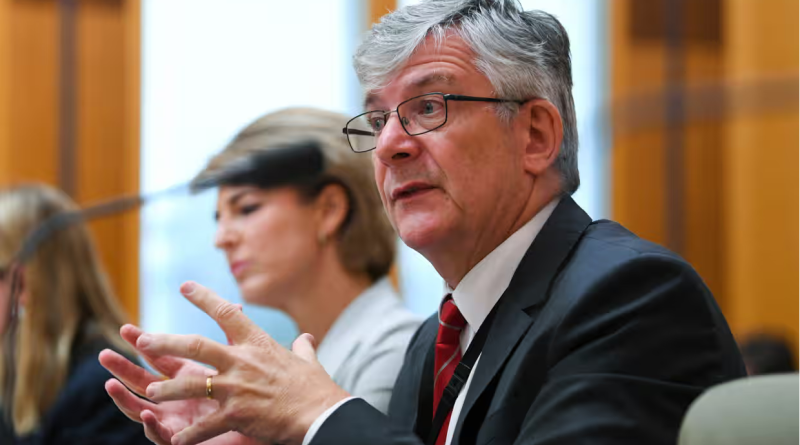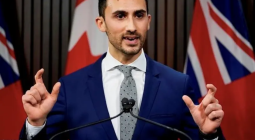Chair of Nuclear for Australia denies that calling CO2 ‘plant food’ means he is a climate denier

Dr Adi Paterson, pictured when chief executive of the Australian Nuclear Science and Technology Organisation, accused Nasa of ‘confusing public understanding by publishing ground surface temperatures’. Photograph: AAP
The chair of a leading Australian nuclear advocacy group has called concerns that carbon dioxide emissions are driving a climate crisis an “irrational fear of a trace gas which is plant food” and has rejected links between worsening extreme weather and global heating.
Several statements from Dr Adi Paterson, reviewed by the Guardian, appear at odds with statements from the group he chairs, Nuclear for Australia, which is hosting a petition saying nuclear is needed to tackle an “energy and climate crisis”.
Nuclear for Australia was founded by 18-year-old Queensland nuclear advocate Will Shackel, who has said repeatedly he believes reactors are needed to fight “the climate crisis”.
Two climate science experts told the Guardian that Paterson’s statements were misguided and typical of climate science denial.
Paterson defended his statements, telling the Guardian he was “not a climate denier”. He described himself as “a climate realist” and an “expert on climate science”.
In May, Paterson, who resigned in 2020 as the chief executive of the government’s Australian Nuclear Science and Technology Organisation, suggested on LinkedIn that concerns about climate change were “an irrational fear of a trace gas which is plant food”. He has been a regular guest on right-wing media outlets since the Coalition earlier this year said it wanted to lift the ban on nuclear and build reactors in seven locations.
On his Facebook page, Paterson has said that “cold is more dangerous than warm” and described a leading scientist as a “climate creep”.
On LinkedIn, he said US space agency Nasa was “deliberately confusing public understanding by publishing ground surface temperatures”, saying the agency’s climate work “should be given to a credible independent group. Defund NASA!”
In April, Paterson told an audience at the Centre for Independent Studies that “you can’t make a correlation between extreme events and climate” and said “no matter what you believe about carbon dioxide – it is plant food”.
“Increasing carbon a little bit is not going to dramatically change the climate. The plants will grow better,” he said, saying the planet was in a period of low CO2.
Prof David Karoly, a councillor at the Climate Council and a respected atmospheric scientist who has been studying the affects of CO2 on the climate since the late 1980s, said Paterson’s statements were typical of those from climate science deniers.
He said while CO2 levels were currently low in comparison to other times in Earth’s history, they were higher than at any time since the emergence of homo sapiens.
“He is misguided,” Karoly said. “CO2 has led to increases in temperature extremes, extreme rainfall, sea level rise and increases in bushfires and fire weather. CO2 has already dramatically changed the climate.”
Dr John Cook, an expert on climate change misinformation at the University of Melbourne, said Paterson was “regurgitating arguments” across a range of “thoroughly debunked talking points”.
He said: “It’s inconsistent to argue that CO2 is a trace gas which can’t possibly make any difference but at the same time claim that CO2 is going to green the planet.”
Shackel did not respond to questions. In an interview with the Guardian, Paterson argued the UN’s climate change panel “has made it very clear” that it was “not possible at this point” to link extreme events to changes in the climate.
But the panel’s latest report said it was “an established fact that human-induced greenhouse gas emissions have led to an increased frequency and/or intensity of some weather and climate extremes”, with evidence for rising temperature extremes, extreme rainfall, droughts, tropical cyclones and more dangerous fire weather.
Paterson said he did think rising levels of CO2 were a problem and that fossil fuels needed to be limited “as soon as we can”. “It is a very, very serious problem but it is not a climate crisis,” he said.
He said he had been concerned about climate change for many years but said unduly worrying children over the issue was “a form of child abuse”, and “the chance of significant catastrophic events” occurring in the next 30 years “related to an increase of CO2 in the atmosphere in the southern hemisphere” was “small”.
Paterson added he was more concerned about the “ecocide” from building wind and solar farms” than about climate change.





